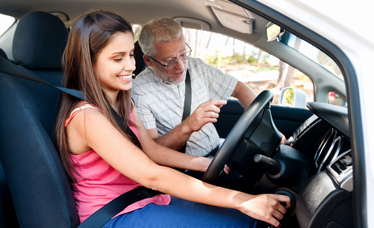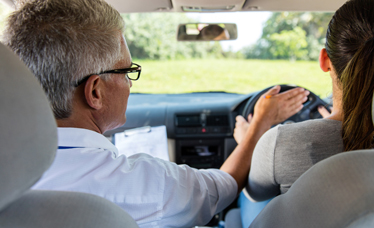Chapter 10 – Section 1
Steps if Involved in a Collision
New Jersey law requires drivers to notify the police of collisions where there is injury, death, or vehicle or property damage.1 If you have a collision, it is your responsibility to stop, alert other drivers, contact the police, get help, exchange information, show proof of financial responsibility, and complete a written collision report. If you are involved in a collision, follow the steps below whether the collision is a minor fender-bender or a fatal collision. If you are a witness, you should also follow these tips to help protect those who are involved.
A. Stop
The first step is to stop and remain calm. Any person involved in the collision must stop at the scene of the incident. You should stop at the scene or as close as possible without blocking traffic. If the vehicles involved are creating a major traffic hazard, you may move them before the police arrive. Leaving the scene of a collision is a major mistake and is considered a hit-and-run where severe penalties are assessed.
B. Contact the Police / Get Help
If there is any significant damage to a vehicle or property, you must contact the police. If any person is injured as a result of the collision, you should notify the police of this when you call. You can also ask witnesses to help if needed. If you have the medical training, you can administer basic first aid or CPR. The only time you should move an injured person is if there is immediate danger, such as a fire or oncoming traffic. If anyone is killed, do not move the body or allow anyone else to move it until the police or an ambulance arrives. If you are shaken up, you should seek help yourself.
C. Alert Other Drivers
You should alert other drivers on the road that a collision has occurred. You can do this by turning on your emergency flashers, setting up road flares, or using other means to let people know that there is a hazard ahead. This is especially important if the crash occurs in a busy area.
D. Exchange Information
If the police arrive at the scene, they will help out with exchanging information. But if the police are not present, you should exchange the following important information: the name, address, and driver’s license numbers of the drivers, the license plate numbers of the vehicles involved, the name and address of any people injured, the name and address of any witnesses, and the name, address, and insurance policy numbers of the vehicle owners. You can help the police by answering their questions and providing details about the crash.
E. Show Proof of Financial Responsibility
The Motor Vehicle Commission requires that you show proof of automobile liability insurance at the time of the collision. You may face a fine, community service, license suspension and insurance surcharges if you cannot present this proof when requested to do so.
F. Complete A Written Collision Report
Within ten days of any collision that results in death, injury, or at least $500 in property damage, you need complete a written report of the collision and send it to the Motor Vehicle Commission if no police report is filed. If you do not complete the report when required, your license may be suspended and you may face a fine. You can get a collision report form from the police.
G. Notify Insurance Company
If the collision results in death, injury, or at least $500 in property damage, you need to notify your insurance company at once. Give your agent complete details about the crash.
Note: If you cause property damage to a parked car or other object and are unable to locate the owner, you must leave a note in a conspicuous place on the affected vehicle or object. Include your name, address, phone number, driver’s license number, the date and time of the crash, and an estimate of the damage.
Insurance
To legally operate a motor vehicle in New Jersey, you must show proof of financial responsibility.2 The law is in place to make sure every driver in New Jersey has insurance or enough money to pay for losses in case of a collision. This law helps to keep our highways safe from irresponsible drivers.
You can prove financial responsibility by purchasing an insurance policy from a company licensed to do business in New Jersey. The policy must provide the following minimum limits of these types of coverage:
- $15,000 for bodily injury and property damage liability, which pays for injury and property damage
- $30,000 for personal injury protection (No Fault), which pays for your medical expenses resulting from the collision
- $5,000 for uninsured motorist coverage
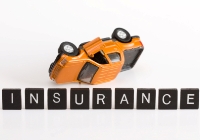
The minimum insurance coverage required in New Jersey may not sufficiently protect you.
Keep in mind that the minimum coverage required by the state of New Jersey may not sufficiently protect you. Sure, you may pay $500 less than your friend each year on insurance, but before you congratulate yourself for saving some money, consider that your friend may be adequately protected while you are not. Any damages that exceed the limits of your policy will come out of YOUR pocket. The savings you think you obtained by purchasing the minimum amount of coverage will be wiped out by the extra costs you will have to pay beyond what your insurance covers. If you have just the minimum insurance coverage, consider purchasing the highest level of insurance coverage that you can comfortably afford to protect your property and assets. Remember – if you are ever involved in a collision, the issue will not be how much you saved on your insurance, but whether you have enough coverage.
Now, how can you save on insurance while still being adequately covered? One way to do this is to shop around. Insurance rates can vary from insurer to insurer for exactly the same coverage. However, be sure to research an insurance company before purchasing a policy. Increasing your deductible is another good way to lower your rates. Choosing a higher deductible lowers your premium, although you will have to pay more out of your pocket if you get into a crash. The savings in the long run add up, however. Besides raising your deductible, examine what your insurance covers and see what you do not need. If you have an older car, the value of your car determines whether collision or comprehensive coverage is worthwhile, since repair costs may exceed the value of your vehicle. A photograph can have great sentimental value. You may not need towing coverage, particularly if you are a member of an automobile club. Also, if you already have sufficient health insurance, you do not need medical coverage under your auto insurance. In addition, any of the following may help to reduce your premium, so ask your insurance company about them:
- Airbags and automatic seat belts.
- Anti-theft device such as “Lo-Jack.”
- The vehicle is a secondary use vehicle or only used for pleasure driving.
- You drive less than 7,500 miles a year.
- You are a full-time student with a “B” average or better.
- You have noviolations or collisions on your driving record.
- You have successfully completed a defensive driving course, such as this one.
Uninsured Driving: Risks and Consequences
It is against the law to drive in New Jersey without automobile liability insurance. Those of us who meet the requirements pay more for insurance to cover the risk of being injured or suffering damage caused by a driver who is uninsured.
If you need to appear in court for a moving violation or a collision, you may be asked to show proof of insurance coverage for the day of the offense. Failure to comply results in a license suspension.
Insurance Variables
Many factors affect your driving… You know that, and the insurance companies also know that. Listed below are many of the variables that affect your driving and the reasons why they may work against you when your insurance rate is calculated.
A. Age
Statistics show that both old and young drivers have a higher probability for collisions than do the middle-aged. Crash numbers verify that teenagers are involved in a substantially higher number of fatal and non-fatal collisions than other drivers. The often casual and carefree lifestyle and attitude and lack of maturity of those under 30 also contribute to collisions. Additionally, senior citizens are higher risks to insure because their reaction time and motor skills slow as they become older, leading to a gradual deterioration of driving ability.
B. Vehicle Type

Sports cars are often quite cost-prohibitive to insure.
Vehicles with high market values and sticker prices are more expensive to insure because replacing these types of vehicles is more expensive. Also, certain vehicles are more prone to theft because their replacement parts are in high demand. The Corvette is a popular American sports car. Sports cars are often quite cost-prohibitive to insure, since they are often purchased for their power, handling, and speed, a formula that may also lead to a collision.
C. Motor Vehicle Record
Unsafe driving results in traffic citations. The assumption is that collisions will follow after traffic citations are received. Since collisions lead to insurance claims, a poor driving record is a good way to see your insurance rates soar. A record of traffic collisions or citations leads to substantial increases in insurance rates.
D. Marital Status

Insurance rates tend to be lower for married couples.
Statistically, single people are more likely to be involved in a traffic collision than married people. Companies know this fact and rate people accordingly.
E. Smoker/Non-Smoker
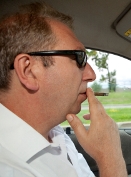
Insurance rates tend to be higher for smokers.
People who smoke often have higher insurance rates than those who do not. The hands of a smoker are not always on the steering wheel, so he or she has less control of the vehicle. There is also the potential to drop hot ashes, a lit match, or a lighter, which may cause a collision or loss of vehicle control. Consequently, insurance rates tend to be higher for smokers, as the likelihood of a collision is greater.
It is best to smoke only when the vehicle is not in motion.
F. Location
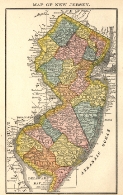
Insurance premiums vary depending on where you live.
In certain cities, many drivers on the roadways do not have insurance. The chances of involvement in a collision with an uninsured motorist are higher in these cities. Other areas may have high traffic density and a greater number of traffic collisions. Insurance companies adjust premiums based on these factors and the probability of a claim originating from the city in which you live.
Video: “Bump and Rob”
Sometimes you may get involved in what appears to be an “accident” or even a road rage situation. Watch the following video to learn about a real-life crime that is being committed on today’s highways. Don’t be a victim; watch the video and be informed.
When someone hits your car, you do need to pull over so you can exchange information and fulfill your other responsibilities. However, your safety is more important, so if it is a minor collision, stop in a public place nearby where there are more witnesses and report it to the police. This mayalso help defuse a dangerous situation with a hostile driver.
1 New Jersey Statute 39:4-130, 39:4-131
2New Jersey Statute 39:3-29, 39:6B-1, 39:6B-2










